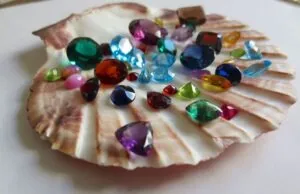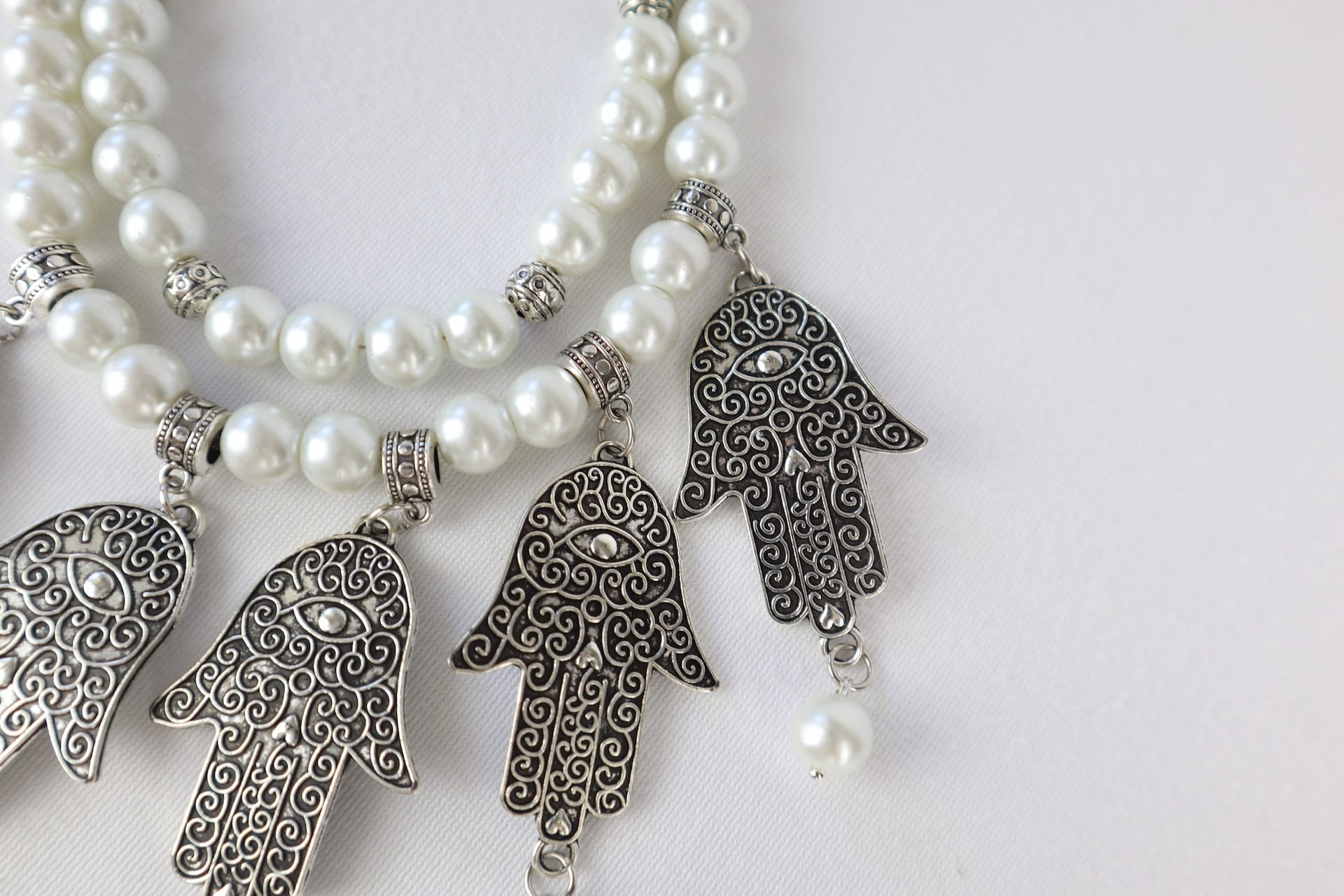
Table of Contents
You may not know its name, but you have definitely seen this symbol somewhere or other. The Hamsa is one of the most easily recognizable symbols of all time with religious and cultural significance in many parts of the world. It is a mysterious amulet, worn as a talisman to protect you from evil.
The Hamsa symbol has many variations but is commonly depicted with an eye within a hand. It is popularly worn as a pendant or a charm and sported by celebrities from Jennifer Aniston to Madonna.
However, there is a lot of confusion surrounding the Hamsa. Are you allowed to wear it and if so, how should you wear it? Let’s have a look at this beautiful symbol to answer these questions.
What’s In a Name?
The word Hamsa means five in Hebrew. This symbol is also known by many names. These include:
- The Hand of Fatima: This name is derived from Islamic beliefs and is named after Fatima, the daughter of the Prophet.
- Hand of Miriam: In Jewish culture, the Hamsa is a symbol of the Hand of God. It is called the Hand of Miriam after the sister of Moses and Aaron.
- The Hand of Mother Mary: This name comes from the Christian tradition, where the symbol has been named after the mother of Jesus, Mary.
- Hamesh: The word hamesh means five in Hebrew. It represents the name ‘Heh’ which is one of God’s many names.
Some other variations are Humes hand, Khamesh, and Khamsa.
The History of the Hamsa
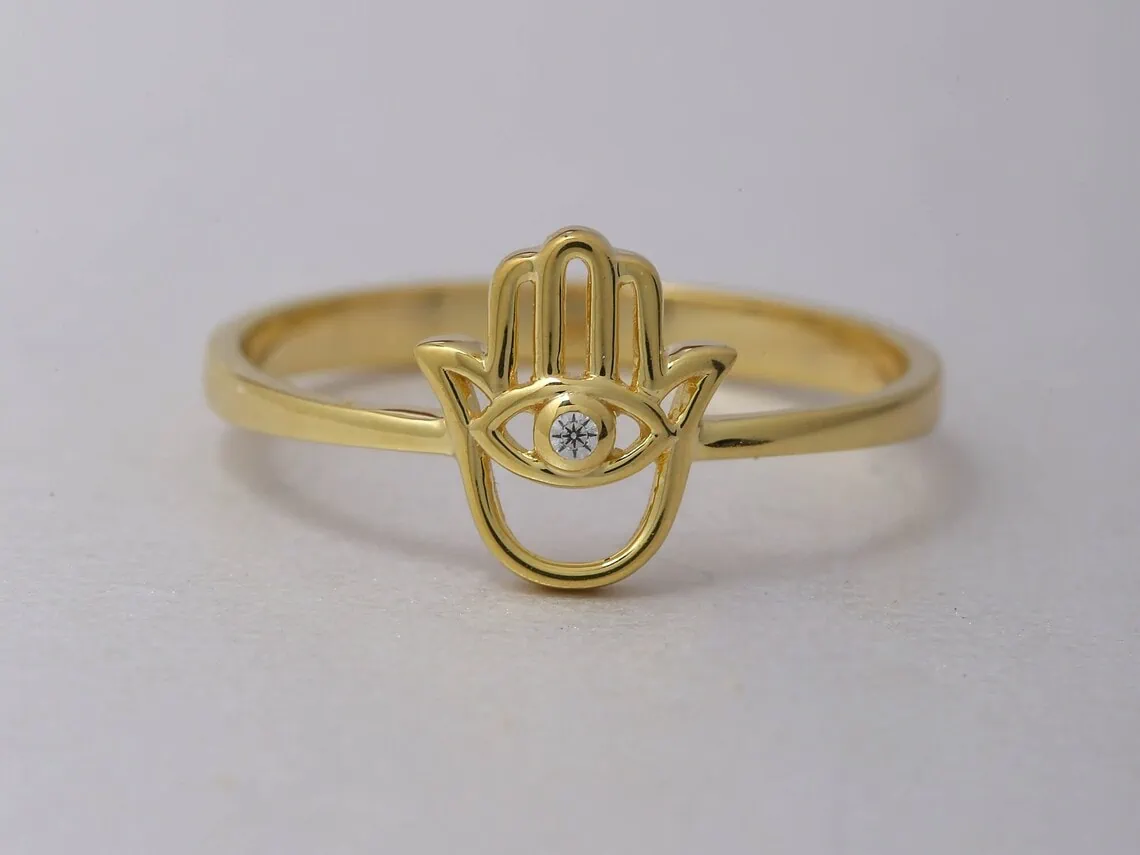
As you might have guessed, the Hamsa is one of the oldest symbols with a history that dates back at least 1800 years, pre-dating all the major religions. The symbol first originated in ancient Mesopotamia (present-day Iraq) and Carthage (present-day Tunisia). It has great significance to Middle Easter and North African people.
It is believed that the symbol was created by the Phoenicians who used it as an amulet. Over time, it continued to be seen as a symbol of protection from evil, especially from the ‘evil eye’, that primal fear that has existed in almost all cultures.
Hamsa Hand Meanings and Styles
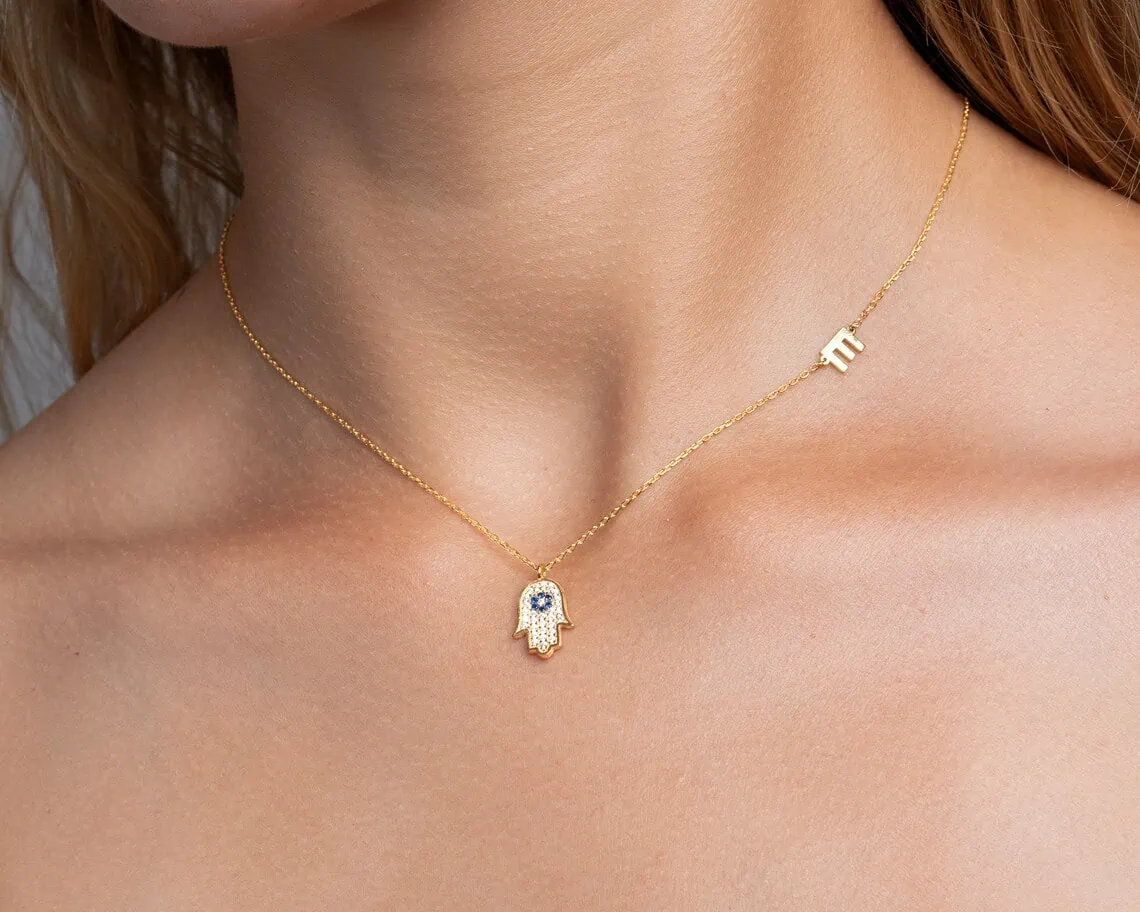
The Hamsa has different meanings to different groups of people. However, the common thread is that it is a protective symbol that brings in luck, health, happiness, and good fortune, warding off evil and negative feelings.
In many cultures, even today, there is a prevailing superstition that if a person with evil thoughts in their heart gazes at you, their evil eye can cause bad things to happen. So, by wearing a Hamsa, you intercept that negativity and it does not cause you harm.
The two main styles that the Hamsa comes in are with the hand either up or down.
If the hand faces upwards, it is a sign against evil. It is representative of protection and repels the negativity of others and protects you from your own negative thoughts, such as envy, hatred, and greed. The fingers may be spread apart to repel evil.
If the hand faces downwards, the Hamsa represents abundance and goodness. It becomes a welcoming sign that invites good things into your life. In this position, the fingers are generally close together, as a sign of invitation for good luck.

Some Hamsa variations don’t contain an eye, but the most common depictions show a human eye in the center of the palm. Most times, the thumb and the little finger are depicted as identical in size and shape.
The Hamsa has often been misunderstood because it is seen as ‘the evil eye’. People wonder, why would you wear an evil eye? What people fail to understand is that the Hamsa is not the evil eye. Rather, it wards off evil from others’ eyes.
The Hamsa Significance in Different Religions
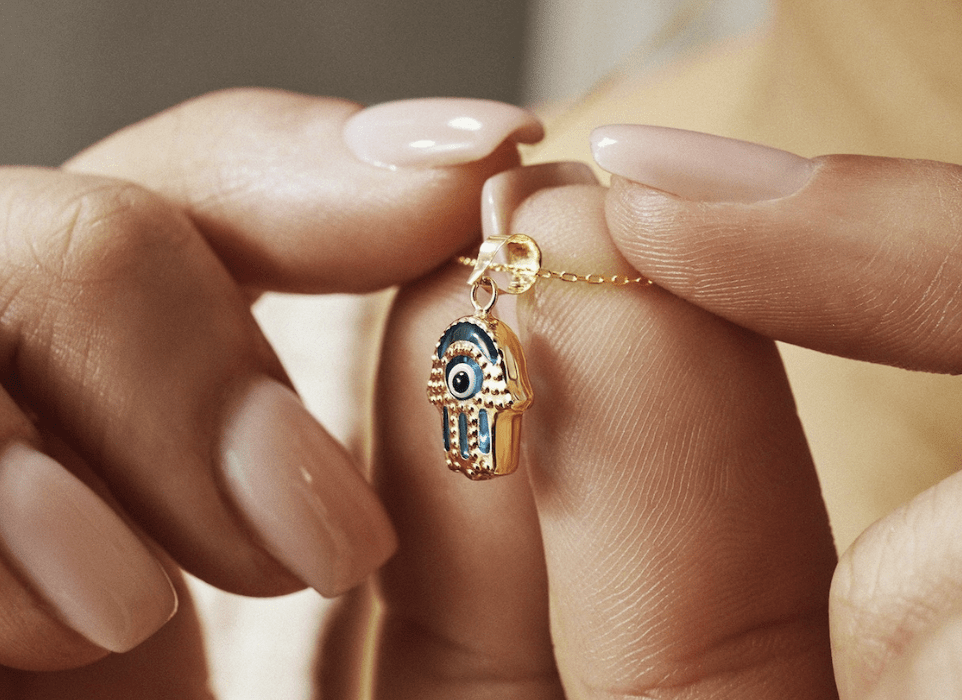
It’s very interesting that the Hamsa has significance in all the major religions in the world! Evidence of the Hamsa is seen in Christianity, Islam, Judaism, Hinduism, and Buddhism. However, the meaning varies for each of these religions.
Hamsa Hand Meaning – Islam
The symbol means different things to the Sunni and Shi’te sects of Islam. For the Sunni, the symbol represents the 5 pillars of Islam. For the Shi’te, it represents the Five People of the Cloak. It is generally called the Hand of Fatima in Islamic circles.
Hamsa Hand Meaning – Hindu and Buddhism
According to Hindus and Buddhists, the Hamsa represents the flow of energy of the chakras in your body as well as the five senses and mudras. Each finger of the Hamsa is representative of a chakra and an element.
Hamsa Hand Meaning – Christianity
As I said earlier, the Hamsa is sometimes called the Hand of Mary after Jesus’ mother. It’s true that in Christianity, symbols apart from the cross are generally rejected, but due to the connection with Judaism, the Hamsa is often accepted in Christian circles. The Hamsa is a symbol of the position of Mary, exalted above all mankind, as a compassionate and caring Mother. It can be seen as a reminder of how God has the power to exalt an ordinary person.
However, many Christians are often confused about whether or not the Hamsa should be worn by a Christian as it also has connections to other religions and spiritualism. If you are a Christian, this is entirely your decision to make based on how you feel about wearing it.
Hamsa Hand Meaning – Judaism
In Judaism, the number five has holy connotations, representative of one of God’s names as well as of the Torah’s five holy books. The five fingers also remind the wearer to praise God using the five senses.
Types of Hamsa Jewelry
The Hamsa is popularly worn on pendants, resting in a position where you can see the beautiful symbol when you look downwards. You can find it in various metals, colors, and styles. Some like this one are exquisitely crafted in precious metals for a stunning and high-quality look. If you are looking for a long-term pendant, then go for something like that, which is durable and of high quality.
If you are after a more light-hearted, fun piece, consider a colorful and trendy pendant like this gorgeous Hamsa. It has all the elements of the Hamsa, including the eye, but remains a stylish and stylized representation.
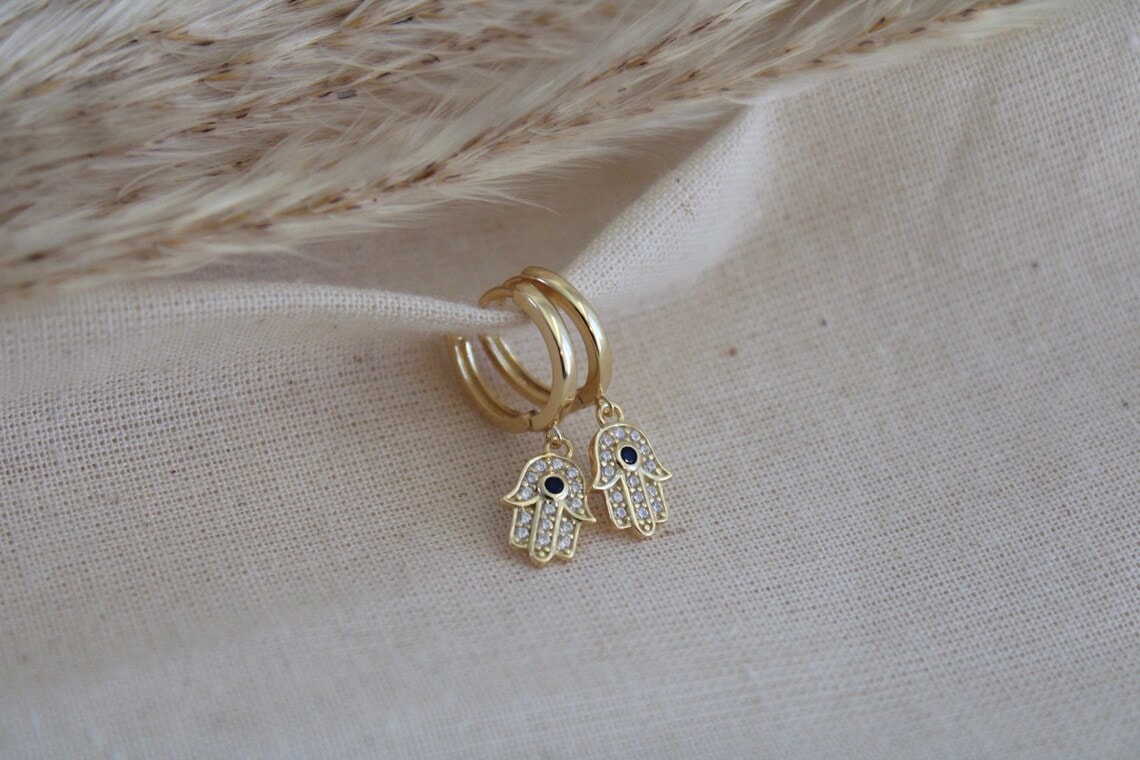
Hamsa bracelets are another great way to wear this symbol. Every time you look at your hands, you’ll be reminded of the positive connotations of this symbol.
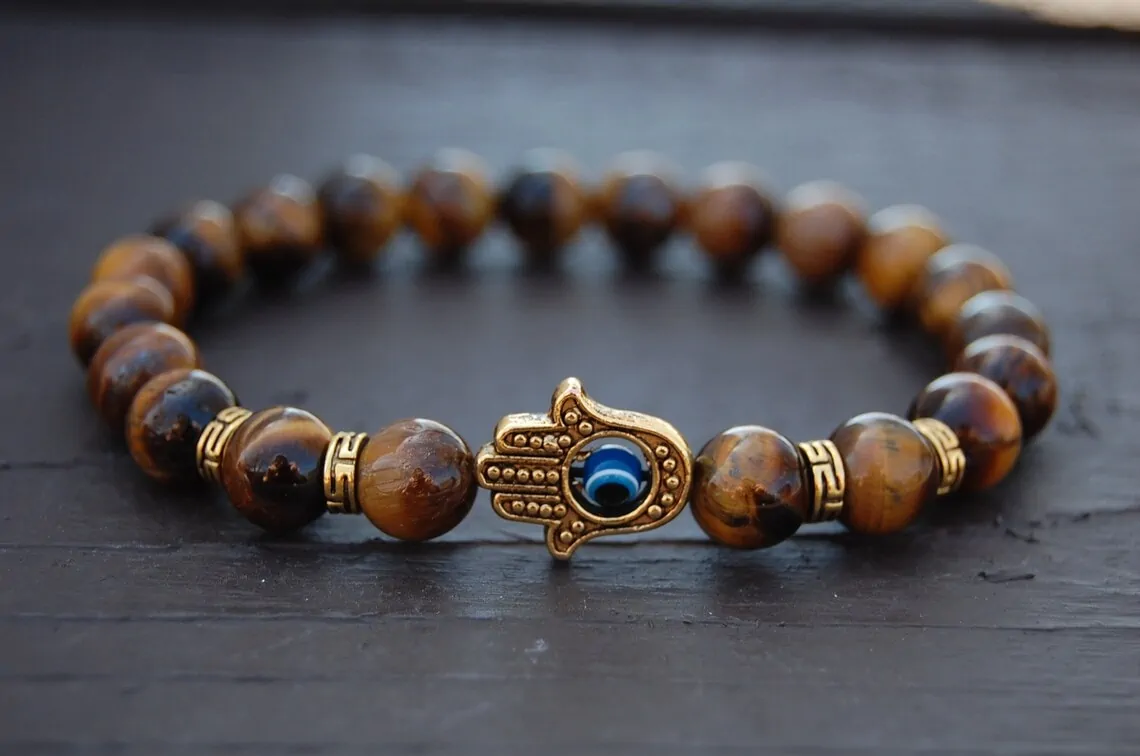
The Hamsa can also be found crafted into earrings and rings, but these are less common. But if you want to see the hamsa symbol yourself, earrings aren’t the best option.
Should I Wear the Hamsa Symbol?
The Hamsa is a meaningful symbol it can be culturally insensitive to wear it without knowing what the symbol means. Having said that, anyone can wear the Hamsa regardless of their faith or beliefs. There is a lot of religious meaning attached to the Hamsa, so be aware of this if you prefer to avoid a religious symbol.
However, the Hamsa also has multiple meanings that are universal to all humans:
- It is a representation of unity, considering that it is a common thread between all major religions.
- It is a symbol of protection which is a universal theme not restricted to religion. It is also a symbol of femininity, as the hand represents various compassionate and strong female figures.
- Considering that the Hamsa had existed before the advent of organized religion, we could view it as a spiritual symbol as well.
Wrapping Up
Before you purchase your very own Hamsa jewelry, consider whether any of these meanings means something to you. Wearing a Hamsa is a way of expressing yourself and what matters to you.
Seen in this light, the Hamsa transcends fashion trends, becoming more of a piece of jewelry imbued with positivity, and even spirituality to add to your look.








